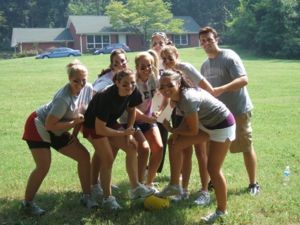The Four Stages of Planning Recruitment
Contents
Four Stages of Planning
The Planning Stage
Their are four stages in planning for rush/recruitment. The first and most important phase, is the planning stage. The recruitment advisor should have a detailed plan and calendar in place as early as possible. This blueprint should include:
- Confirmed room reservations.
- Submission of the request for mailing labels.
- A final draft of the welcome letter and other public relations tools.
- Established deadlines for mailing letters and distributing public relations materials.
- A finalized calendar of meet nights and rush events.
- Being sure the mailing is sent in a timely manner.
Again, it cannot be emphasized enough, the importance of having your plan completed early. Ideally, recruitment should be planned for the fall semester/quarter before school ends in May/June.
Meet nights/Information Sessions
The second stage will be the meet nights, or informational sessions. Meet nights are traditionally the first time that prospective members will meet and interact with the chapter members. Thus, it is critical that members be enthusiastic and welcoming. Remember, you never get a second chance to make a first impression. While recruitment advisors are responsible for coordinating these events, they should not feel obligated to complete all the preparations and presentations on their own. Ask the chapter historian to create an appealing display board or speak about the organization’s accomplishments. Invite the initiate advisor to summarize the requirements of the initiation program. Just make sure that the speakers know ahead of time about their responsibilities, and are prepared! Also, have items for prospective members to view and peruse for a better understanding of Phi Sigma Pi and the chapter, such as:
- Recent chapter photos or chapter composite.
- The chapter’s charter.
- Scrapbooks.
- Awards and trophies.
- Fraternity publications (i.e. Purple & Gold, The Lampadion).
- A Phi Sigma Pi map with stars or pins indicating the locations of other chapters.
- Appropriate chapter t-shirts.
- Favors or souvenirs from formals or other events.
- Chapter mementos.
- Information about rush events (dates, times, locations).
Rush Events
The third stage of recruitment will be the rush events. Successful rush events are a primary factor in cultivating and maintaining the prospective member’s interest in Phi Sigma Pi. Thus, the recruitment advisor’s goals for these events should be entertaining the prospective members while informing them of the benefits of membership in the fraternity. Be creative in planning your rush events! Remember to make them fun and welcoming. One way to do this is by hosting theme parties, which provide great ambiance and allow people to show their personalities (remember, alcohol is strictly forbidden at any rush event). Some possible themes are:
- the wild, wild west
- Casino
- The beach
- Specific decades (50’s, 60’s, 70’s)
- Mardi Gras
- Halloween
Consider incorporating scholarship or service events into the schedule as well. This will allow the prospectives to become familiar with Phi Sigma Pi as a tripod-based organization.
Evaluation
The fourth and final stage of the process is evaluation. Once recruitment is over, it will greatly benefit future recruitments to know what worked well, and what needs improving. In fact, the best people to ask are the prospective members who attended, including those who decided not to join. Also, the chapter must ensure that its recruitment meets the national standards. Each semester/quarter, the chapter should be holding at least two information sessions and two rush events. This is a minimum; but remember that more events allow more time for the brothers to meet the prospective members, and vice versa. Remember, a successful chapter starts with successful recruitments. Make every semester/quarter count!
Disclaimer
All content submitted to the Phi Sigma Pi Wiki-based Resource Guides is considered the shared property of Phi Sigma Pi and its members. Please do not submit content unless you are comfortable that it may be edited, amended, altered or removed by other contributors. Malevolent destruction of content and/or posting of blatantly inappropriate content may be considered conduct unbecoming a brother.
Content that is likely to be considered unacceptable and inappropriate includes, but is not limited to: content relating to illegal activities of any kind, or activities prohibited by Phi Sigma Pi or University Rules or Regulations, references to (legal or illegal) use of alcohol or drugs, sexually explicit material or references and/or content describing or promoting hazing, discrimination, or harassment of any kind.
The appearance of external hyperlinks does not constitute endorsement by Phi Sigma Pi of the linked web sites, or the information contained therein. Phi Sigma Pi does not exercise any editorial control over the information you may find at these locations. Any external hyperlinks should conform to the rules as outlined in Editing FAQs otherwise they may be removed. Inappropriate adding of external hyperlinks may be considered conduct unbecoming a brother.
All content in the Resource Guides should be considered as advice only, and no content or advice should be followed if in conflict with the Phi Sigma Pi National Constitution, University Regulations, or state, local, or federal law.

